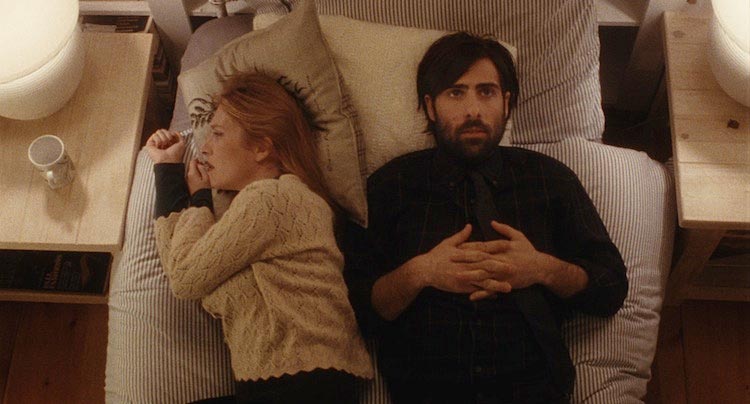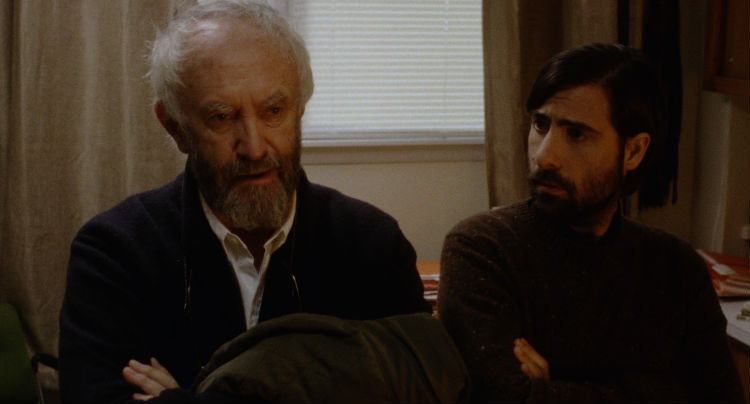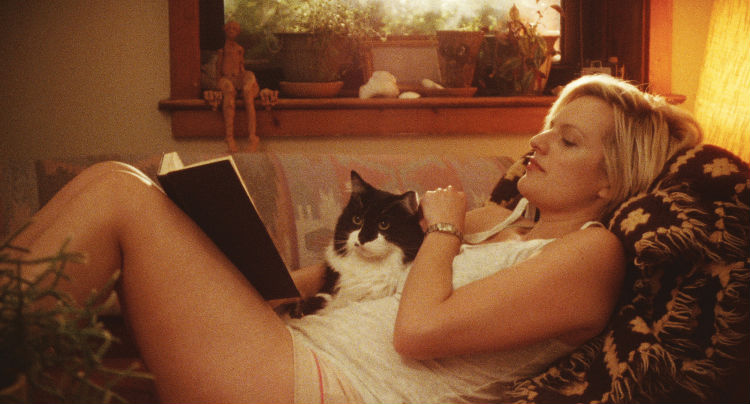
If you can bear it, Perry and Schwartzman's misadventures of a misanthrope is an intriguing study in misery.

If you can bear it, Perry and Schwartzman's misadventures of a misanthrope is an intriguing study in misery.
Listen Up Philip, an unpleasant film I enjoyed almost masochistically, is most interesting when viewed as a cinematic vote of confidence from its writer/director, Alex Ross Perry, to his lead actor, the incomparable Jason Schwartzman. The indie filmmaker casts Schwartzman as one of the most irritating archetypes that exists in modern America: the narcissistic, cynical, East Coast intellectual who loves wearing tight-fitting plaid button-ups and sweaters and treats everyone around him like garbage. (I could have distilled that description down to that more familiar H-word, but pointed self-loathing, especially after this movie, is too irresistible to pass up–I’m admittedly a sucker for tight-fitting plaid button-ups and sweaters.) The point is, Schwartzman is tasked with carrying the film as author Philip Lewis Friedman, a character so objectionable and infuriating that the risk of audience walk-outs is very, very real. But Perry had faith in him, a faith that was rewarded–somehow, some way, they’ve fashioned the misadventures of an insufferable misanthrope into one of the most idiosyncratic, intriguing films of the year.
The film operates in a mode unmistakable to Woody Allen and Noah Baumbach devotees: Through a skittish handheld camera we see Philip angrily marching into an NYC sandwich shop to meet with an ex-girlfriend he hasn’t seen in a while. She’s late, which angers him thoroughly (a tendency of his we learn by way of narration by Eric Bogosian, who guides us through the film by revealing the characters’ inner thoughts and referring to past and future events). He was planning on giving her an advance copy of his second book, but her transgression causes him to rescind the gift, tear her apart with laser-precise verbiage, and storm off in a fit.

We’d feel sorrier for the poor girl if she didn’t look so accustomed to Philip’s toxic behavior, but as the story unfolds we bear witness to Philip’s decimation of several more relationships, the victims of which don’t get off so easily. His supportive, sweet girlfriend, Ashley (Elizabeth Moss, aptly cast), has informs him that one of his idols, Ike Zimmerman (a terrific Jonathan Pryce), a similarly arrogant but far more accomplished author of several classics (the hilarious, retro book covers and titles are wonderful), has invited Philip to stay at his country home, away from the distracting hustle of the city. He obliges without hesitation, abandoning Ashley, to her despair. He leaves her with a sweet farewell: “I hope this’ll be good for us…but especially for me.”
Philip is the ultimate version of the despicable 21st Century know-it-all, taking devilish pleasure in tearing people down with his intellect. He meets with an old college buddy specifically to tear him down, piece by piece, over a drink. When his publishers insist that he do publicity for his book, he refuses to do any interviews or appearances, a pretentious move even a more respected writer, like Zimmerman, would be an asshole to pull.
Unlike characters Schwartzman’s played in the past who are similarly smarmy and arrogant, there’s nothing endearing or likable about Philip in the slightest. It’s a tough role to pull off, but Schwartzman approaches it with,ironically, no ego. He doesn’t want to be cute and he doesn’t want to be liked; it’d be unfair to call Philip an anti-hero, because he’s unquestionably villainous. He’s the kind of guy no one wants to be around, and yet Perry subjects us to his presence and asks us to indulge in his horrible behavior. That’s where Moss’ Ashley comes in handy. For a good chunk of the film, Philip leaves the picture and we come up for air as we follow Ashley’s road to recovery in the wake of Phillip’s exodus. She’s incredibly sympathetic and lovely, and her portion of the film is an absolutely essential respite from Philip’s downer-parade.

Zimmerman is the key to unlocking the true essence of the story. The ornery, aging author is a mirror image of Philip, like a ghost of from the future announcing the pathetic existence Philip’s doomed to inhabit once he’s lost his youth and friends. Zimmerman, like his protégé, has a kinder female counterpart, his emotionally estranged daughter, Melanie (Krysten Ritter). He neglects her and considers her nothing more than a nuisance, which breaks her heart on the daily. Ritter, like Moss, maximizes her onscreen minutes, expressing her resentment and love for her father through tearful eyes and a strong stance. We spend the whole movie watching Philip reject and ridicule the few good influences in his life (the girls) as he sinks into the same quicksand of despair his mentor has fallen into. We want him to listen up, but he’s too far gone.
Void of sentimentality, Listen Up Philip is one of those movies you have to be in the exact right mood for to derive any sort of enjoyment. If you’re feeling particularly spiteful or bitter, I could see the film being pretty cathartic, actually–the barbs and put-downs Schwartzman delivers are sharply written and very funny, and while sometimes Philip’s pure evilness will make you grimace, most of the time it’ll make you laugh with recognition, albeit reluctantly. Three films deep, Perry’s career looks to be looking bright as he hones his craft and comes into his own. While his stylistic inspirations are completely transparent (Wes Anderson with the bohemian milieu and book covers, Woody Allen with the jazz horn soundtrack and 16mm grit), he pays tribute to his predecessors in the best way possible, by taking their tools and building something new with them.